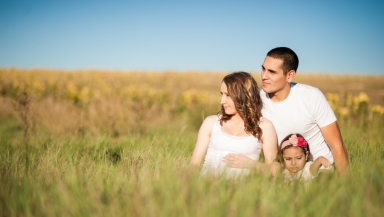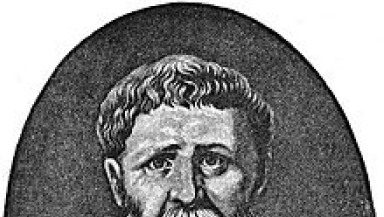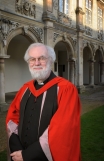
I don't have children, but I've been around enough of my friends' babies and toddlers to know two things. First – they're amazing. The way their tiny fingers and toes are crafted. The way a baby smiles and giggles long before she can talk. The joy of discovering the world anew through the eyes of a toddler and his 10,000 questions...
The second thing I know about kids is this: they're selfish, demanding, manipulative and a whole lot of hard work.
For me, these two sides sum up not just children, but all of us. We are each fearfully and wonderfully made and created 'imago dei' – in the image of God. But each of us has the capacity for incredible selfishness and self-centredness – which we often act upon.
This is the reality of life – we see good and bad in our daily lives. Many of us will know fantastic Christian communities, full of people who open their homes to those struggling with homelessness, domestic abuse and trouble with the law. This is a glimpse into what humans are capable of – real love, joy and radical welcome.
But we also know about the bad humans are capable of. This week, at the Church and Media Conference (among the many excellent and inspiring speakers) delegates were subjected to a masterclass in self-promotion by TV personality and newspaper columnist Katie Hopkins. Before her appearance, we were read a litany of her worst comments – her disdain for refugees, her aggression towards people with weight problems and her complete lack of remorse for various other offensive remarks.
We all have the capacity for evil. And we all act on it, to a certain degree. But that's not what our culture tells us. Our culture says we're basically good. We've all heard people say, maybe when discussing their belief in God, that "I'm a good person" or, "I've never hurt anyone."
That's the basis of a claim made in an interesting piece by George Monbiot in The Guardian this week. Monbiot is an excellent writer – a fearless campaigner on climate change, a passionate advocate of justice for downtrodden people and a man whose example lives up to his rhetoric. But this piece struck me as incredibly naïve about human nature. It was entitled, "We're not as selfish as we think we are. Here's the proof." What followed was a serious attempt to prove with various data that actually, humans are overall a 'good' species and that we should stop thinking of ourselves as selfish:
"A study by the Common Cause Foundation, due to be published next month, reveals two transformative findings. The first is that a large majority of the 1,000 people they surveyed – 74% – identifies more strongly with unselfish values than with selfish values. This means that they are more interested in helpfulness, honesty, forgiveness and justice than in money, fame, status and power. The second is that a similar majority – 78% – believes others to be more selfish than they really are. In other words, we have made a terrible mistake about other people's minds."
Let's leave aside the fairly obvious flaw in this argument – namely that people, when surveyed, said that on the whole they were nice. Instead let's focus on the core of the point being made. That people are good. All the surveys in the world aren't going to convince me that this is true. Because a lifetime of experience – of my own life and of others – tells me that while we are good and carry the image of God, we are also deeply flawed. Any analysis which ignores this huge caveat to our goodness is doomed to fail.

But why does any of this matter? Well, this is far from being a theoretical argument. It goes to the heart of how we organise ourselves as a society. If Monbiot is correct and most of us are essentially good, then why bother with government? Why bother with welfare provision? Why bother to work for equality and justice? If most of us are good, surely these values will shine through?
Monbiot realises that's not the case of course, so later on says:
"Another problem is that – almost by definition – many of those who dominate public life have a peculiar fixation on fame, money and power. Their extreme self-centredness places them in a small minority, but, because we see them everywhere, we assume that they are representative of humanity."
Really? The moral status of a person is determined by if they're in public life or not? It doesn't take long to see that this isn't the case. What are we to do with Martin Luther King?
This is where the Christian Tradition offers a rich and compelling story about who we are and what defines us. St Augustine was the first to codify it, but it goes back to the foundations of Jewish theology – the idea that were are made in the image of God but that image is marred – by what we call Original Sin.
Atheist philosopher John Gray understands well the power of Augustine's thought. He has railed against the idea of 'progress,' insisting that even though he doesn't believe in God, Augustine's account of us as being 'fallen' rather than wholly good is far closer to reality than his fellow atheist progressives are willing to allow.

Gray says of Augustine, "In placing the source of evil within human beings, Augustine's account is more humane than myths in which evil is a sinister force that acts to subvert human goodness. Those who believe that evil can be eradicated tend to identify themselves with the good and attack anyone they believe stands in the way of its triumph."
Augustine's own understanding of the doctrine of original sin was sharpened and shaped by his interactions with a 5<sup>th Century version of Monbiot – a British Monk called Pelagius. Pelagius thought that we as humans are essentially good. He gained a band of followers and his message spread far and wide. But this was heresy. Augustine saw that if Pelagius was right – and that humans could choose to be good – then our need for God's grace and the life, death and resurrection of Jesus would all be called into question.
Again, it's worth saying we aren't talking about theological technicalities here. Our 'theological anthropology' (what we believe about human nature) guides how we live our lives and radically affects world history. Gray himself, as well as others such as the journalist Peter Oborne, have written about the way in which the progressive mindset, which suggests we are getting better and 'more good' as a human race, has been responsible for calamitous foreign policy decisions – for example the disastrous invasion of Iraq. A naïve belief in the inherent goodness of humanity led to a fantastical theory that all that was necessary to bring freedom and equality to Iraq was to get rid of Saddam Hussain and the inherent goodness of the Iraqi people would be set free. As history has shown, this was not the case. Hundreds of thousands of people died and the inherent goodness of people has not shone through in the years since the invasion.
Without acknowledging original sin, how can we understand the great tragedies of our time? The refugee crisis, the looming climate catastrophe or indeed the rise of Islamic fundamentalism? Yet the concept is rarely mentioned in public debate. Indeed when Rowan Williams, then Archbishop of Canterbury posited original sin as a cause of the 2007/8 financial crisis on the BBC's Newsnight, Jeremy Paxman's face was a picture. In astonishment, he asked Williams, "I don't think you actually believe that, do you?" "Oh yes" responded the Archbishop.
There's another danger here of course – that we think of ourselves as thoroughly sinful and bad and incapable of good. This is where Scripture is a helpful corrective. As St Paul writes to Timothy, "The saying is sure and worthy of full acceptance, that Christ Jesus came into the world to save sinners—of whom I am the foremost." He recognises his sin and the deep flaws of his character as a result. But, in the very next book, Paul writes, "I have fought the good fight, I have finished the race, I have kept the faith."
In other words, he sees himself as the chief of sinners, but is still capable of fighting the good fight. Our sin does not define us. It is possible for great works of good to be done, in spite of the selfishness and self-centredness we're all prone to. But to ignore our propensity to sin is dangerous, deluded, and simply wrong. Original sin is a foundational doctrine of Christianity and by extension, our whole culture. For centuries, we've recognised that we are neither fully good nor fully bad and we've created checks and balances to our behaviour as a result of this foundational insight. We walk away from it at our peril...
















